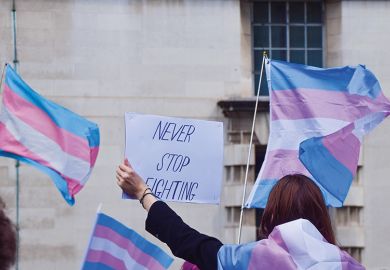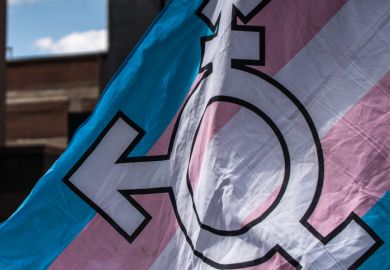The students who (along with members of the local University and College Union branch) blocked entry to a film screening at the University of Edinburgh late last year claimed that it not only breached the university’s “respect” policy but also attacked “trans people’s identities”.
You might think this is exactly the kind of thing England’s Higher Education (Freedom of Speech) Bill was intended to prevent – but it isn’t clear that it would.
Launched “to make provision in relation to freedom of speech and academic freedom in higher education institutions and in students’ unions”, the bill is going through its final stages in parliament. But while it contains many requirements for students’ unions, the same is not true for trades unions. Moreover, it is unclear in this case whether the protesting students were in any sense acting on behalf of the students’ union.
The bill envisages a complaints system that people can use when they feel freedom of speech has been obstructed. But anyone who has experience of the handling of complaints in universities will know that it will not be speedy or straightforward to operate. The provisions for the complaint system are to be contained in a new Schedule (6A) to the 2017 Higher Education and Research Act, which set up the Office for Students. However, the schedule has been tinkered with by both the House of Lords and House of Commons, resulting in a process that could take years to conclude and whose threats seem somewhat confusing.
If it considers a complaint justified, the OfS may only make a recommendation to the offending provider’s governing body or its students’ union, rather than “require anyone to do or not do anything”. On the other hand, if the provider or students’ union fails to comply, the OfS may enforce its ruling through civil proceedings to seek an injunction. That creates a new statutory tort, on whose advisability Lords and Commons are not agreed.
The handling of student complaints began in earnest two decades ago, with the creation of the Office of the Independent Adjudicator under the Higher Education Act of 2004. If the OIA now gets complaints related to academic freedom or freedom of speech, will those now be handed over to the OfS – and if so, how? Might jurisdiction be determined by the politically independent director for freedom of speech and academic freedom that is to be added to the OfS board? Where else might this person have powers to intervene?
The act contains provision for both employees and students to make complaints. But will such a complaint follow on from an existing internal grievance procedure under an employment contract, or the harassment and bullying procedures most universities have now introduced for employees and students alike? When the OfS complaints scheme has run its course for an employee, beyond that lies the option of an employment tribunal complaint – albeit an option that is slow, expensive and limited in the remedies it can offer. Where will an unsatisfied student go next?
The OIA and a number of its staff have substantial experience handling the complaints that come to it. On the other hand, OfS chief executive Susan Lapworth recently conceded that the OfS would be new to handling complaints. How will it fund the extra staff it will need, and how will it train them?
Another question relates to exactly who can make a complaint. There is a lot of description of eligibility in the bill, but I suspect it will still trigger endless disputes. Does eligibility extend to former employees or students of the provider? What about those who have applied for a job there or have at any time been invited to be a visiting speaker? And will complainants be required to establish that they have suffered “adverse consequences”? Perhaps not. Even if it finds no adverse consequences, the OfS is permitted to find the complaint “partly justified”.
Once the complainant has got over these definitional hurdles, they must make their complaint within a specified (but undefined) time limit, having first exhausted “any internal procedure for the review of complaints” within the provider or students’ union. If I complained to the OIA, I would need to bring a “completion of procedures” statement from the provider to show that internal avenues have been exhausted. Will the OfS require one, too?
Should I try the OIA before reaching the OfS, for it does not seem clear whether a complaint considered by the OIA could be looked at again by the OfS afterwards. On the other hand, it is envisaged that a complaint may already be being “dealt with by a court or tribunal”, certainly that it may lead to litigation afterwards. When would double jeopardy apply if the most the OfS could do is to make “recommendations” to a provider?
If I am annoyed by all these uncertainties, perhaps I will disclose my complaint to “one or more other persons”, as the bill puts it in its ban on non-disclosure agreements with complainants. Perhaps I will even publish it. That seems a temptation unlikely to calm the current controversies over free speech, as the legislation intends. Indeed, if students and academics are willing to picket a film showing, who is to say they won't be willing to picket an OfS complaints tribunal, too?
G. R. Evans is emeritus professor of medieval theology and intellectual history at the University of Cambridge.
Register to continue
Why register?
- Registration is free and only takes a moment
- Once registered, you can read 3 articles a month
- Sign up for our newsletter
Subscribe
Or subscribe for unlimited access to:
- Unlimited access to news, views, insights & reviews
- Digital editions
- Digital access to THE’s university and college rankings analysis
Already registered or a current subscriber?




